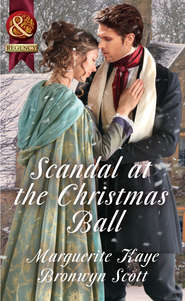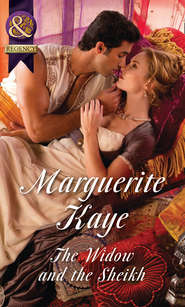По всем вопросам обращайтесь на: info@litportal.ru
(©) 2003-2024.
✖
Scoundrel in the Regency Ballroom: The Rake and the Heiress / Innocent in the Sheikh's Harem
Настройки чтения
Размер шрифта
Высота строк
Поля
‘Until morning, Mr Lytton.’
Chapter Two (#ulink_fa8e69fa-9c7f-5850-80d6-3a9153649071)
Serena arrived at her rooms in the small village of High Knightswood, just over a mile’s distance from the Hall, to find Madame LeClerc awaiting her. Madame was a Parisian modiste anxious to make her fortune in London. On hearing that Serena was leaving for England, she had offered to accompany her. ‘To lend you countenance, chérie, as the bon papa would have wished. I want to set up my own establishment,’ Madame LeClerc had gone on to explain. ‘These wars have prevented the English ladies from enjoying the benefits of our French couture. Now that we are friends again, it is time for the rich mesdames to learn how to dress properly. Like yourself, mademoiselle,’ she added obsequiously.
Serena had accepted Madame’s offer gratefully, being well aware that Papa would not have expected her to travel unaccompanied. Sadly, she soon discovered that the price for Madame’s companionship was significantly higher than the generous salary and lodgings the modiste had demanded. Madame lent her countenance, but her company was tedious in the extreme.
The journey on the packet steamer made Madame heartily sick. She continued to be sick the entire road to High Knightswood, punctuating bouts of nausea with trembling complaints of everything from the carriage springs to the state of the post roads and the dampness of the sheets at the post houses. She spoke very little English, obliging her employer to intervene when things became difficult. With a shudder, Serena recalled a particular episode involving Madame, the land lady of the Red Lion, and an unemptied chamber pot. Nor could Madame come to terms with the English climate. ‘Il pleut à verse. Rain, rain, rain,’ she exclaimed every day, regardless of whether the weather was inclement or not.
As Serena divested herself of her bonnet and pelisse, Madame LeClerc subjected her to a lengthy diatribe on the subject of English food. ‘I am sick to my stomach with the rosbif. All this meat and no sauces, I am starving.’
Eyeing Madame LeClerc’s ample figure, hovering over her like a plump vulture, Serena found this last claim difficult to believe.
‘Look at this! Just look, Mademoiselle Serena! This débâcle is intended to be our dinner. Please to tell me how I, a good Frenchwoman, am meant to eat this?’ With a dramatic gesture, Madame indicated the serving dishes, which were set on the table.
Reluctantly, Serena lifted the covers. She had to acknowledge that their landlady’s cooking was somewhat basic, but after the day she’d had, she was in no mood to sympathise. ‘It’s pigeon, madame, with peas, and perfectly edible. Eat it or not, I don’t care, but please sit down, I have something to tell you.’
Serena served them both before embarking upon the tricky matter of informing Madame that they would of necessity be delayed in High Knightswood while she resolved a ‘personal matter’. Madame, chomping her way steadily through two whole pigeons, distaste writ large on her face, listened in sullen silence. As soon as her plate was cleared, however, she launched into a bitter tirade.
‘You promised me we would be headed straight for London. The Season has already started, I need to find my clientele now, before they have all their gowns. This delay will ruin me!’ A plump white hand fluttered against her impressive bosom. Serena’s companion was for some time loudly inconsolable.
The vague notion she had entertained, of asking Madame to accompany her on her visits to Knightswood Hall, faded from Serena’s mind as the modiste’s anguish grew. She tried to imagine what Nicholas Lytton would make of her companion. Like as not he would send Madame below stairs if he did not send her packing. Serena would then be responsible for the inevitable fracas between Madame and Nicholas’s chef, and no further forward in observing any of the proprieties.
She retired early to bed, but sleep eluded her. In the next chamber she could hear Madame LeClerc’s rhythmic snoring all too clearly through the thin walls. Loud enough to rattle the windowpanes, Serena thought grumpily, plumping the bolster in a vain effort to get comfortable. It had been a trying day. The news of Nick Lytton’s demise had been a shock, though she supposed it should not have been. She was annoyed at herself for having been so unprepared. His son’s promise to help was a mixed blessing. Nicholas Lytton had made it quite clear he did not think her at all respectable.
Nicholas Lytton was a man who gave off danger signals as he entered a room. It would be foolish indeed to ignore them. He carried about him an edge of excitement, as if always on the verge of committing some wild act, about to trespass the safe confines of conduct just for the sport of it. It was this, Serena realised with a start, that drew her too him, rather than the more basic tug of physical attraction. She must be on her guard with him at all times. Despite her unorthodox life, her reputation was spotless. She could not afford to tarnish it now, though it would be a lie to say she was not tempted. A fact of which, unfortunately, Nicholas Lytton was all too well aware.
Perhaps after all she should induce Madame LeClerc to act as her protector. A particularly loud snore came from next door, making Serena giggle. Not even Nicholas Lytton would be tempted to overstep the mark in Madame’s presence. But then he would simply get rid of her. Serena closed her eyes. She was going round in circles, far too tired to argue with herself any more. Surely Knightswood Hall was too remote from London for anyone to care what did—or did not—go on there?
As Serena finally dropped into slumber, Nicholas sat in splendid isolation in the small family dining room of Knightswood Hall, musing on the contentious topic of his father’s will. The table had been cleared and the covers removed. In front of him lay the latest update on the situation from his man of business. Frances Eldon was not optimistic.
The butler placed a decanter of port and a jar of snuff on the table before feeding another log on to the fire and reassuring himself that the curtains were perfectly drawn. ‘Will there be anything else, Mr Nicholas?’
‘No, thank you. Tell my man not to wait up, I’ll get myself to bed. Goodnight, Hughes.’
‘Goodnight, sir.’ The butler bowed and withdrew silently from the room.
Nicholas poured himself a small glass of port, idly swirling it around in the delicate crystal glass. His thoughts, like the wine, circled endlessly. He was tired, and no wonder—it had been a closer contest than usual with Samuel. They had been sparring partners since childhood. Ruefully, he examined his raw knuckles in the glow of the firelight. Hardly the hands of a gentleman. It was high time he stopped such foolishness. And yet—he never could resist a challenge.
But he was twenty-nine now, old enough to know better. In less than three months, as Frances Eldon so needlessly reminded him in his letter, Nicholas would be thirty. If they could not find a way to break the will before that date, his fortune would go to his cousin Jasper—unless Nicholas took Frances’s advice and married.
He had always been so carelessly certain that his lawyers would find a way to overturn the fateful clause, but as the deadline approached and every legal avenue turned into a dead end the decision loomed over him like a menacing black cloud of doom. He should have instructed them sooner. Dammit, there must be a way!
Nicholas rose to stir the fire, carelessly throwing on another log, stepping back hastily as the sparks flew out on to the hearth rug. He was not going to be forced down a path of another’s choosing. He would not be blackmailed into the bonds of matrimony, not even by his own dead father.
His parent had remarried late in life. Melissa was a malleable widgeon, a young woman content to play nursemaid to a man in failing health many years her senior. To the astonishment of all who knew him, Nick Lytton, after a lifetime of raking, settled contentedly into domestic bliss and became an advocate for the institution of marriage into the bargain. The present Nicholas Lytton sighed deeply. He should have seen it coming, after that last uncomfortable interview.
‘I hear you’ve been causing a scandal again, my boy.’ The chill which his father had caught while out hunting had taken hold of his lungs. It was obvious he had not long to live. Nicholas remembered each breath his father took as a painfully sharp intake, a long drawn-out rattling exhale. What he couldn’t remember now were the exact circumstances of the scandal the old man was so upset about. Some bit of muslin Nicholas had tried to pass off as one of the ton at a party, as he recalled. Yes, that was it, a bet, and he had lost when the lady told a rather warm story and had then been recognised by one of her previous protectors.
Before Melissa, his father would have laughed, but with his second marriage the old man had acquired a pompous righteousness. ‘You’ve shamed our name once too often, my boy,’ Nick Lytton wheezed.
‘For pity’s sake, Father,’ Nicholas retorted, ‘you talk as if I was a libertine. As you very well know, I am scrupulous about confining that sort of thing to the muslin company. As you used to,’ he said pointedly. ‘I never raise false expectations. I would have thought that was something more to be proud of than ashamed.’
His refusal to repent served only to bring down the full extent of his father’s wrath on his head. Nick Lytton had stormed, ranted, cursed and finally, when his son showed no signs of remorse, resorted to threats. ‘I’ll see to it that you can’t carry on this life for ever. You’re turning into a damned loose fish, Nicholas, and by God I’ll put a stop to it, you mark my words.’
The interview had ended then. Nicholas thought no more of it until after his father’s death, when he was informed of the significant change to the terms of his will. He’d laughed and refused to take it too seriously. Until now.
Not even in his salad days had Nicholas come close to being in love, finding that passion faded all too quickly once sated. His dashing looks and flamboyant generosity made him a highly sought-after catch, but not once in all his years on the ton had any lady managed to stake a claim. He was far too careful for that, unlike some of his peers. Poor Caroline Lamb’s latest attempt to avenge herself upon Byron, so it was rumoured, was a thinly disguised roman à clef. Nicholas shuddered at the very idea of encountering the spectre of a rejected lover hovering at a society party, never mind the iniquity of the details of any affaire being bandied about in the press.
No, he made a strict point of confining his amours to women from a different sphere who understood the rules of the game perfectly well. Over the years he had been fortunate in his mistresses, all of whom combined beauty with experience. When he grew bored it was a simple thing to pay them off. No sulks. No pain. No regrets. Just a few trinkets, a generous sum, a goodbye. It suited him. It was how he had chosen to live his life, and he enjoyed it. He saw no reason to change.
Dammit to hell, he would not change. Nicholas consigned Frances Eldon’s letter to the fire. When the lawyers had exhausted every possibility, then perhaps he would force himself to contemplate marriage. Right now he had better things to think about. Like the luscious Mademoiselle Serena Stamppe and her preposterous tale of hidden documents and long-lost friendship.
The friendship part could be true—his father had been wild in his youth. The wars with France favoured many a person wishing to hide their dirty laundry in the hustle-bustle of the Continent; no doubt that Serena’s dear papa was one such. An adventurer of some sort, of a certainty. She was obviously an adventuress herself—she had given herself away with that remark of hers—what was it—an itinerant life.
Stamppe. The name was definitely familiar. He would write to Frances in the morning, tell him to crack the whip over the will, and get him to find out what he could about the lovely Serena and her father. Yawning, Nicholas placed the guard over the fire, snuffed out the candles, and headed wearily for his bed.
In the end, Serena decided not to introduce Madame LeClerc to Nicholas unless it became absolutely necessary—and she refused to allow herself to contemplate just what she meant by that. She made an early start the next morning, leaving her lodgings long before her companion surfaced for breakfast. On the assumption that the search would be dusty work, she wore a simple dress of printed cotton and sturdy half-boots of jean. A short woollen cloak protected her from the early chill of the English spring, and her hair was looped on top of her head, a bandeau of the same material as her dress holding it in place.
Charming was the epithet with which Nicholas Lytton greeted her, himself simply attired in fitted buckskins that clung to his muscular legs, teemed with a dark blue waistcoat and plain dark coat. He clasped Serena’s gloved hands between his for a brief moment on greeting, but made no further attempt to touch her. She could not make up her mind whether to be relieved or not.
They sat together in the small morning room over a pot of coffee, discussing how best to tackle the search using the only clue they had. ‘I suppose it’s safe to assume that the hiding place really is here,’ Serena said. ‘You don’t have any other houses with rose panelling, do you?’
‘No. And both the London house and the hunting box post-date the time you said your father gave mine his papers—over twenty years ago, do I have that right?’
Serena nodded. ‘He told me he sent them not long after I was born.’
‘Where was that?’
‘La Bourgogne. Burgundy—it is where my mother comes from.’
‘So that is where you would call home?’
‘No, Maman’s family did not approve of the marriage. My parents would not talk about it. I don’t think there’s anywhere I’d call home, I’ve never stayed in one place long enough to put down roots.’
‘Why not?’
She thought for a moment, her lips pursed, a small frown drawing her fair brows together. ‘It’s strange, but I’ve never really questioned why. Papa said it was expedient for his—his business interests, but I’m not sure that’s wholly true. He just liked to travel. I’ve lived in some beautiful cities, Vienna, Rome, Strasbourg, and Paris of course, but I’ve always considered myself an outsider. We lived so much, my parents and I, in a little world of their making. I have any number of acquaintances, but I don’t really have any friends of my own.’
‘May one ask what precisely Papa’s business interests were?’
‘Oh, he dabbled in lots of things,’ Serena said vaguely. ‘He preferred me not to become involved in such matters.’
‘Whatever your father was involved with, it must have been lucrative. I could not fail to notice the quality, and expense, of that delightful outfit you wore yesterday. Assuming, of course, it was your father who provided the funds.’
He was looking at her with that curling half-smile that made her pulses flutter and raised her hackles at the same time. ‘You think I have a rich protector? A fat, elderly gentleman perhaps, on whom I bestow my affections in return for gifts?’
Nicholas felt a sudden and most unexpected pang of jealousy at the thought of anyone being in receipt of Serena’s affections. His smile hardened.











